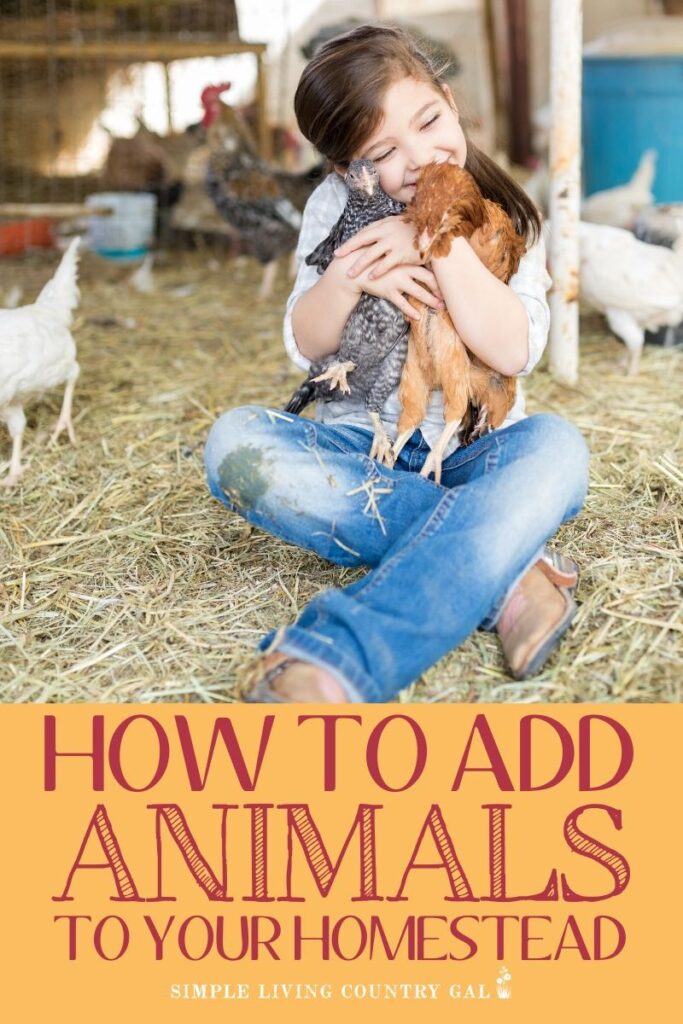How to Choose the Best Homestead Animals
Learn how to choose the best homestead animals so you are raising the best choice for your family and where you live.
Homesteading tips that will help you to love your farm and create one that supports your entire family.
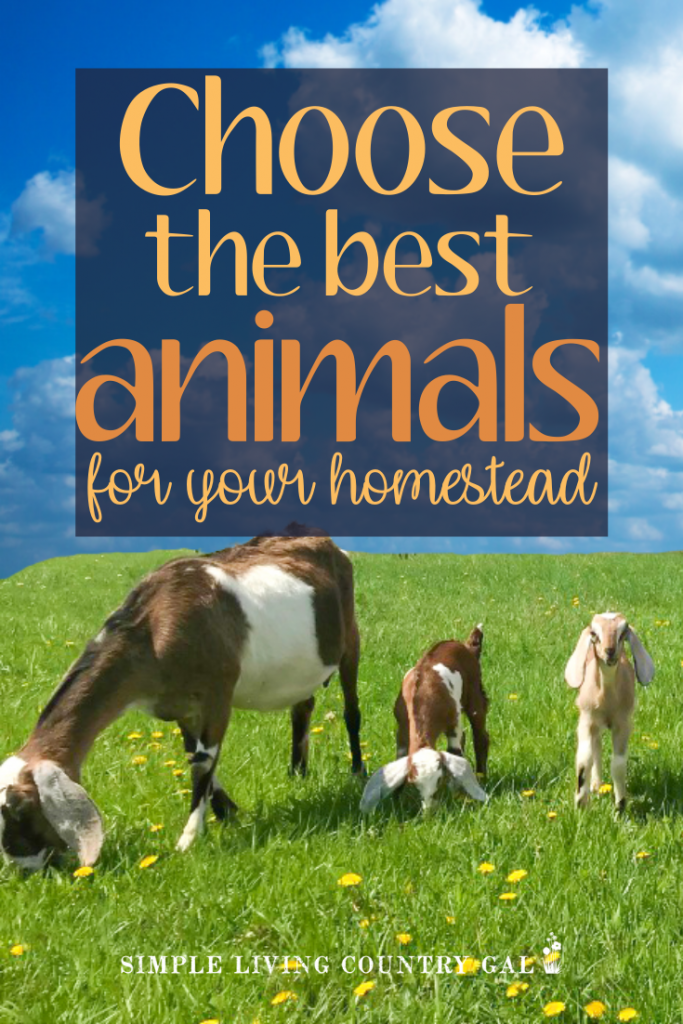
This guest post is by Julie a fellow homesteader who loves to grow, raise, cook, and preserve her own food.
When most people think of homesteading, a small farm comes to mind. This includes homestead animals, gardening, food preservation, and much more.
But when you are starting out, it can be overwhelming to know what you should do first.
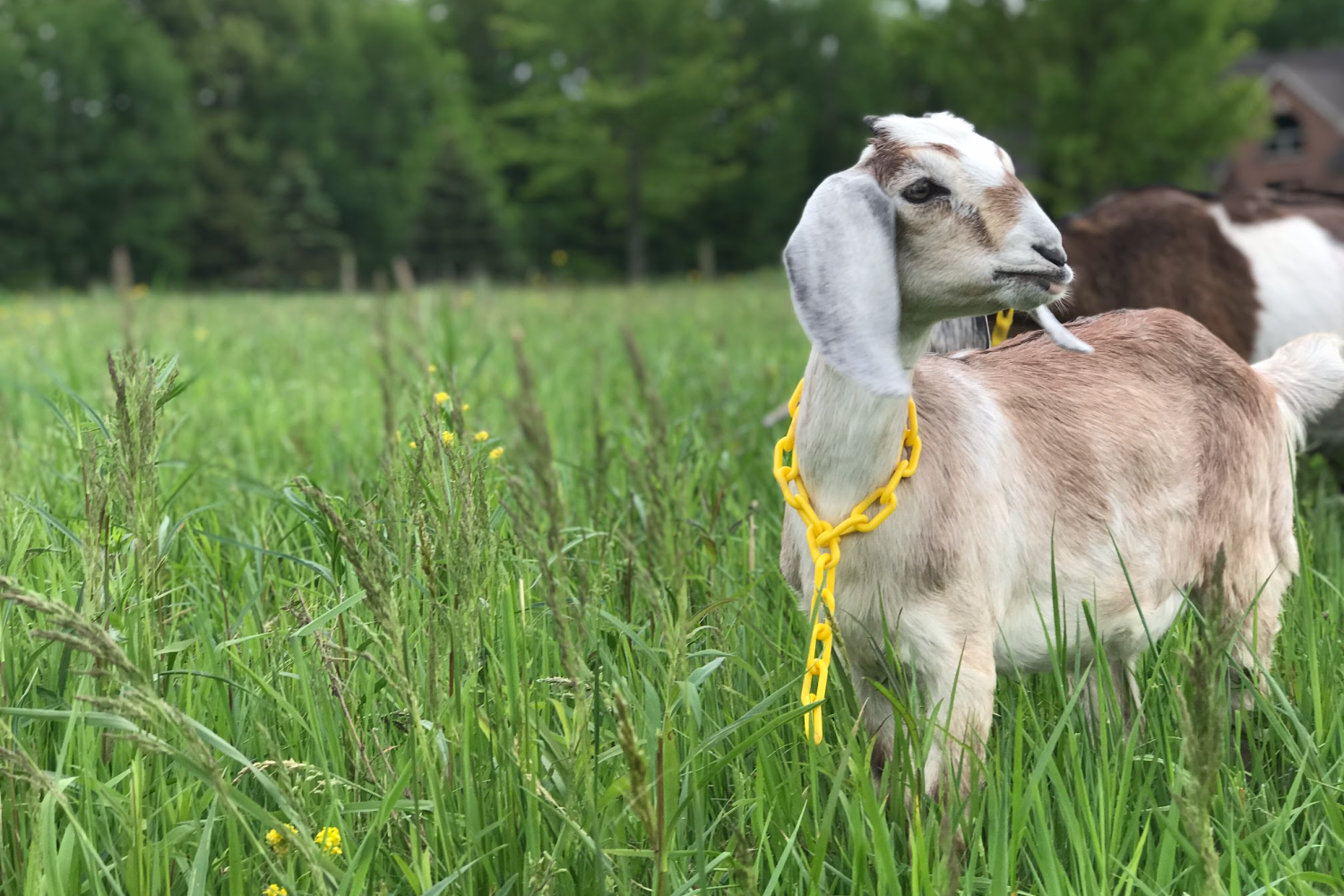
Where should I put my garden? What animals should I get? Do I have room for a dairy cow?
All of these questions plague new homesteaders, mostly because they want to do all the things all at once.
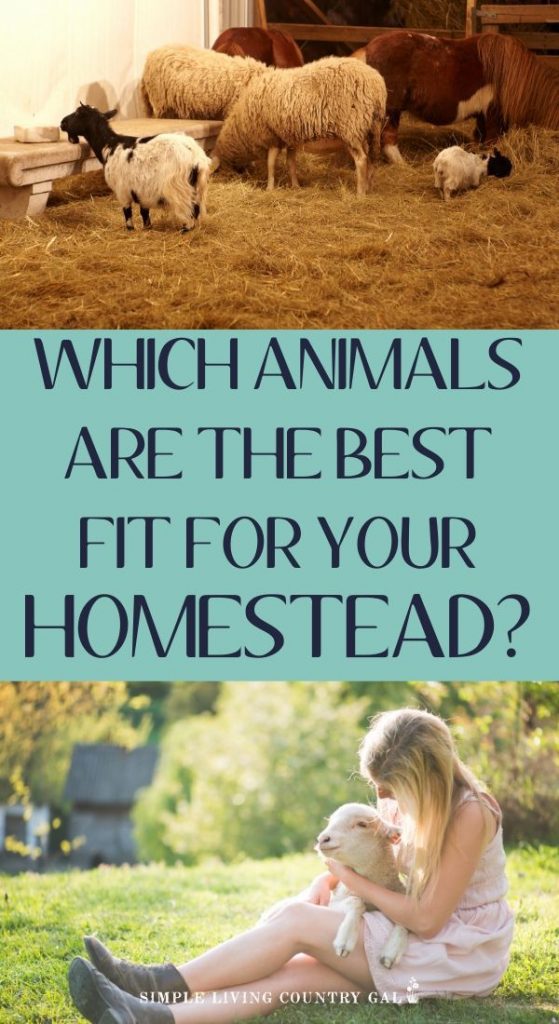
So today, we are just going to talk about one aspect of beginner homesteading: what animals should I choose for my homestead?
How to Choose the Best Homestead Animals
Farm animals and homesteading go hand in hand. But how do you know which animals to start with and when it is time to add more?
How do you choose animals without overwhelming yourself and your resources?
First, you need to figure out your why.
Why do we want to add animals to our homestead?
Farm animals are cute, but they are also extra responsibility and money. So before you grab the first cute chicks you see at the feed store, think about why you want them on your homestead.
Do you want to butcher your animals? This will determine what breeds you should get and how you will shelter and feed them.
Do you want your animals to be productive or just for show?
Are you already familiar with how to take care of them or are you learning for the first time?
Answering these questions honestly and understanding your “why” behind raising animals on your homestead can help you avoid trouble and heartbreak in the future.
What to consider before getting homestead animals?
1. Am I allowed to have animals where I live?
If you live in town, whether in the city or suburbs, there may be rules about what animals you can own.
Even though some places are getting better about allowing backyard chickens, many HOAs still don’t allow farm animals.
So make sure you are complying with the rules you agreed to when you moved in.
If you can’t have large farm animals or even chickens, don’t despair! You might still be able to have rabbits or bees to get you started.
2. How much room do you have?
Obviously, certain animals take up more space than others. You want each animal to have enough room to feed and grow properly.
If you don’t have much space (less than an acre), you might want to start with chickens, rabbits or bees.
If you have more space, you can add goats, pigs, cattle or a dairy cow. These animals need room to roam and graze, so extra room is necessary.
3. Do you go out of town often?
Some homestead animals are more self-sufficient than others, so if you are a frequent traveler you may get frustrated easily with always having to find a farm sitter.
All animals will need to be fed, watered, and protected from predators.
You can set up automated systems to feed chickens and rabbits. They will be happy for several days without interference.
Honeybees are fairly self-sufficient, especially in the summertime.
Cattle can graze and drink from the pond in the summer but need more attention in the winter.
Possibly the animal that needs the most attention every day is the dairy cow. They are often milked twice a day, except during calving season.
So if you decide to have a milk cow, you need to make sure someone else knows how to do the milking when you are unable to.
4. Will they produce something useful?
In my opinion, the best animals for self-sufficiency should produce something useful for the homestead. Being cute doesn’t cut it.
This could be meat, eggs, fur, protection, manure or other byproducts.
After all, you are providing food, water, and shelter for these animals. They should be giving back something to the homestead as well.
5. Can they be eaten?
This can be a touchy subject. Not everyone wants to butcher their animals for food.
But if you are living on a functioning homestead, you should be able to butcher and eat your animals.
If you don’t have the skills to butcher your own animals, it should be a priority to learn. Whether they are small like chickens and rabbits or large like pigs and cattle, it is a great homesteading skill to learn.
If you don’t want to kill your animals, just know that you may be feeding and caring for them way past their prime. For instance, a 5-year-old hen that doesn’t lay eggs anymore.
But this is a personal decision and needs to be factored in when deciding what animals to raise on your homestead.
6. Are they adapted to my climate?
Not all animals are best for every homestead environment. Different breeds are better adapted to the cold or heat and humidity of certain places.
So when you are adding animals to your homestead, talk to locals about the best breeds for your area.
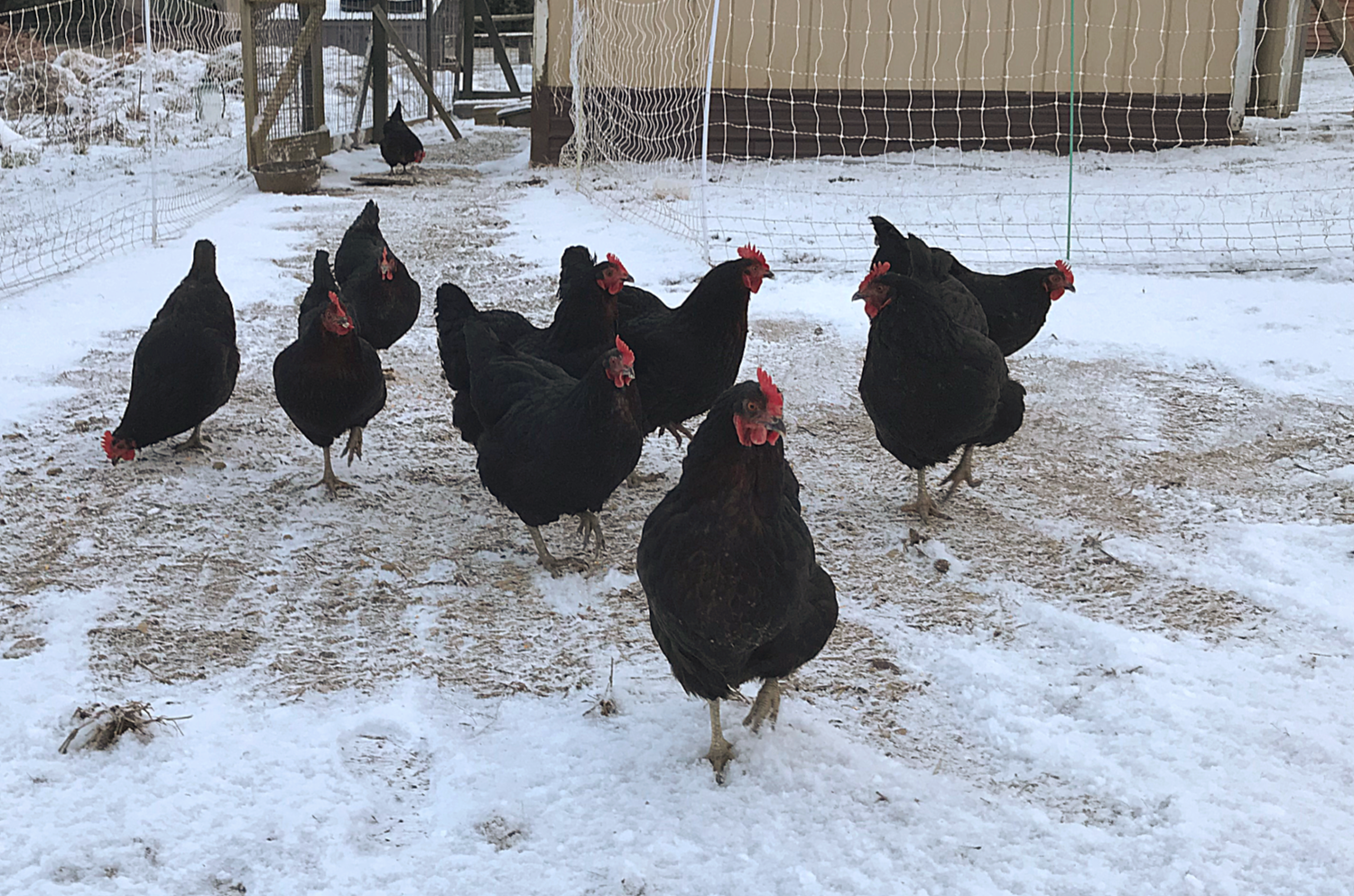
What are the best animals for new homesteaders?
There are many kinds of animals you can add to your homestead. Many people have exotic birds, llamas, alpacas, etc. and they love them.
This list is just the basics of homesteading animals to give you an idea of the possibilities when you are starting out. But by all means, get creative if that’s how you roll!
1. Chickens
Backyard chickens have been called the “gateway animal” for homesteaders. This is the animal that comes to mind when you think about homesteading or farming.
Chickens can provide your homestead eggs, meat, manure, and more when you provide them daily water, food, and protection.
You will need to build them a coop/run area for them to stay safe from predators and a place to lay their eggs for easy access by you.
2. Meat Rabbits
Rabbits can be great pets indoors or out. But for a homestead, we should really be discussing raising rabbits for meat.
In order to breed efficiently, you should have one buck, and several does so that they can rotate.
New Zealand Whites and California breeds are the best for raising meat rabbits because they have more meat than smaller breeds.
Rabbits don’t require much room (a hutch with a couple of rooms will work). You just need to feed and water them daily and clean out their cages.
3. Honeybees
Having honeybees can be very rewarding and frustrating, but if you do it right it will be worth the effort.
Buying the supplies and bees to start a hive is fairly expensive. You may be able to find used hives or build your own to save on costs.
Once you have the hive set up, they are pretty self-sufficient all summer long. You can check on them every once in a while to see if they are filling up the hive.
In the winter, they will need supplemental food to survive, especially in cold environments. This is often when a hive can leave or die without warning, so keep a close eye on them.
But as far as homestead animals go, they don’t take daily feeding and keep to themselves most of the time. And they are great for pollinating your garden!
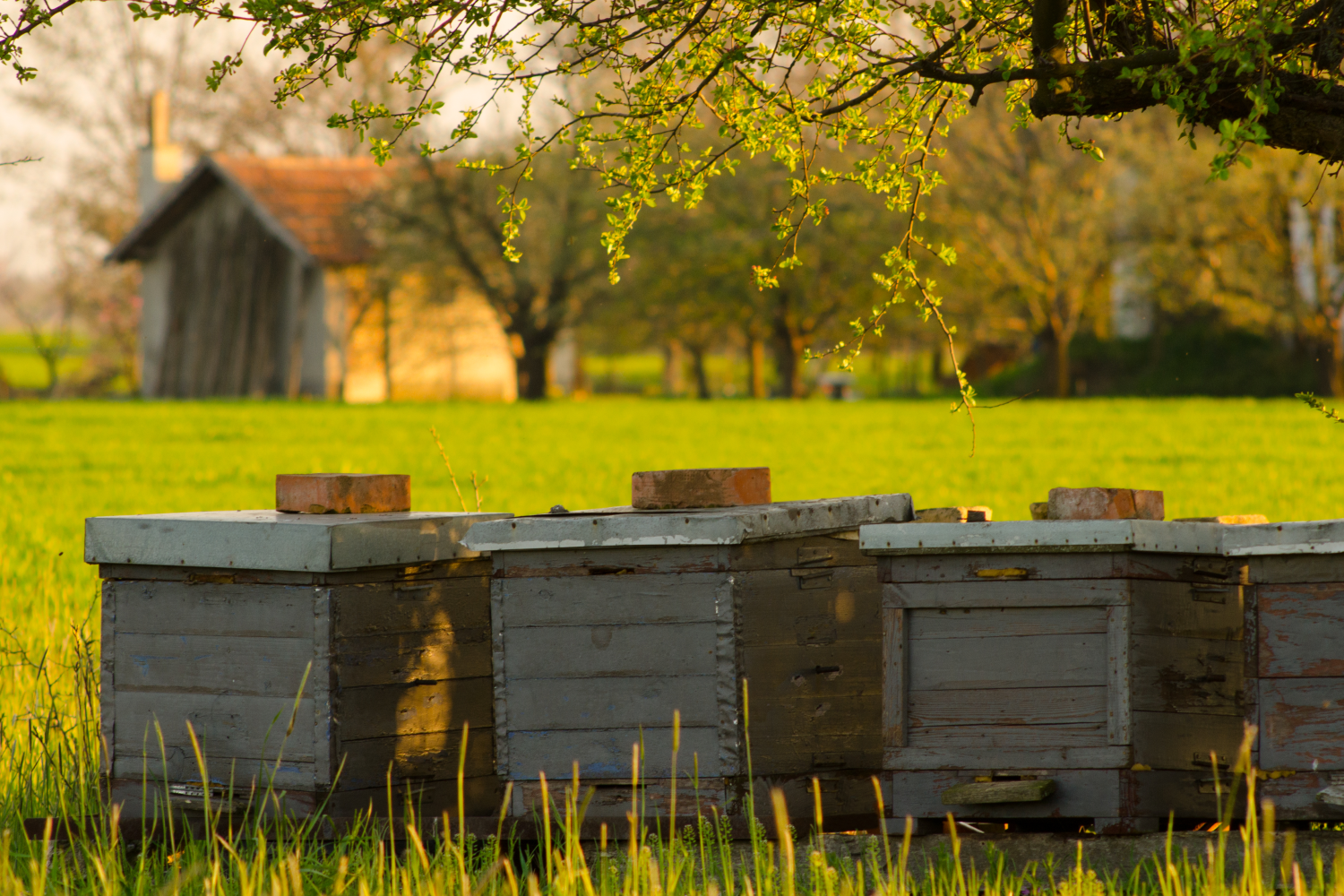
4. Goats
I have never raised goats, but I know they can be good newbie homesteader animals to raise.
Of course, I know here at Simple Living Country Gal, Tracy Lynn talks about goats all the time. So I will defer to her knowledge on this subject.
All I know about goats is that they are cute and fun to watch, but they can also tear things up and get out if you are not careful to create a home that is safe to keep them inside where they belong.
More Goat Housing Resources:
5. Pigs
I also have never raised pigs, but they can be great farm animals for homesteaders who don’t want to bother with animals during the winter.
You can buy a piglet in the spring, raise it all summer, and take it to be butchered in the fall for awesome, homegrown meat.
They will eat just about anything and are mostly content as long as they have food, water, and shelter.
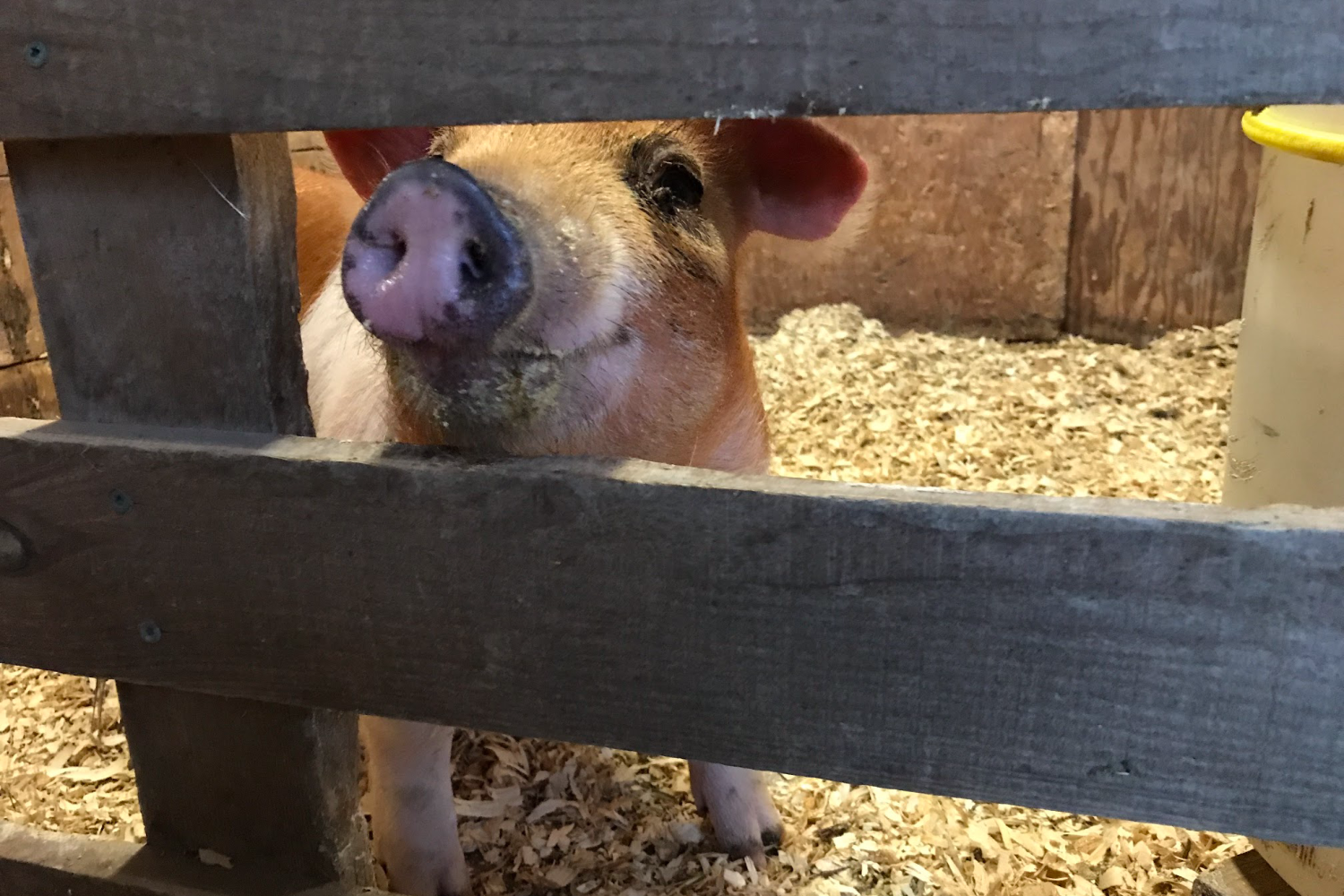
6. Cows
We definitely don’t have room on our homestead for cows, but if you do, they can be a great addition. If you have lush pasture and good fences, they will be happy all summer long.
In the winter, they will need food, water, and shelter like most other animals. If you calf responsibly, you can replenish your herd and have enough meat for your family each year.
Our Experience with Homestead Animals
I decided early on that I wanted every animal on our 4-acre Southwestern Colorado homestead to be productive, not just cute.
We also live in a neighborhood with HOA rules that aren’t super strict but do limit us on large animals.
We started with chickens, which seemed like the logical choice to begin. We buy new chicks just about every spring.
We have also raised and butchered our own meat chickens.
In a year or two, we added meat rabbits. We weren’t super good at breeding them, but we did about once a year.
We butchered the new rabbits and put them in the freezer with the chickens. We also enjoyed the manure the rabbits produced for our garden.
Finally, 2 years ago, we got started with honey bees. We didn’t have much luck with them (a herd of cattle knocked over the hive one year and the next they died off over the winter), but I still have a dream of fresh honey from our own bees.
Every time we think about adding new animals to our homestead, we really take into consideration the time and money it will cost to raise them.
Then we weigh that against what they contribute to the homestead.
Cute is cute, but we don’t run an animal sanctuary. They need to be productive as well.
Choosing what animals to add to your homestead can be a hard decision. But just know that the more thought and preparation you put into it, the better able you will be to take care of them when they arrive.
So figure out your “why” and answer the questions above to make a thoughtful decision. Just because your neighbor or someone you know online has something doesn’t mean it’s right for your homestead.
And whatever animals you choose to raise, take care of them to the best of your ability. They will give you so much back in return.
I wish you luck in your decision and in your homesteading efforts.
What is your favorite animal on the homestead? Let us know in the comments below. And if you found this post helpful, please share. Thanks!
More Homesteading Resources:
- How to Vacation With a Homestead
- How to Keep Animals Cool in the Summer
- How to Reuse Eggshells Around Your Homestead
Julie is a blogger and lover of all things homesteading. She lives with her husband and three children on 4 beautiful acres in Southwestern Colorado.
